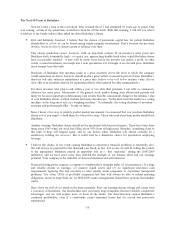Berkshire Hathaway 2014 Annual Report Download - page 31
Download and view the complete annual report
Please find page 31 of the 2014 Berkshire Hathaway annual report below. You can navigate through the pages in the report by either clicking on the pages listed below, or by using the keyword search tool below to find specific information within the annual report.Berkshire Today
Berkshire is now a sprawling conglomerate, constantly trying to sprawl further.
Conglomerates, it should be acknowledged, have a terrible reputation with investors. And they richly
deserve it. Let me first explain why they are in the doghouse, and then I will go on to describe why the
conglomerate form brings huge and enduring advantages to Berkshire.
Since I entered the business world, conglomerates have enjoyed several periods of extreme popularity, the
silliest of which occurred in the late 1960s. The drill for conglomerate CEOs then was simple: By personality,
promotion or dubious accounting – and often by all three – these managers drove a fledgling conglomerate’s stock
to, say, 20 times earnings and then issued shares as fast as possible to acquire another business selling at ten-or-so
times earnings. They immediately applied “pooling” accounting to the acquisition, which – with not a dime’s worth
of change in the underlying businesses – automatically increased per-share earnings, and used the rise as proof of
managerial genius. They next explained to investors that this sort of talent justified the maintenance, or even the
enhancement, of the acquirer’s p/e multiple. And, finally, they promised to endlessly repeat this procedure and
thereby create ever-increasing per-share earnings.
Wall Street’s love affair with this hocus-pocus intensified as the 1960s rolled by. The Street’s denizens are
always ready to suspend disbelief when dubious maneuvers are used to manufacture rising per-share earnings,
particularly if these acrobatics produce mergers that generate huge fees for investment bankers. Auditors willingly
sprinkled their holy water on the conglomerates’ accounting and sometimes even made suggestions as to how to
further juice the numbers. For many, gushers of easy money washed away ethical sensitivities.
Since the per-share earnings gains of an expanding conglomerate came from exploiting p/e differences, its
CEO had to search for businesses selling at low multiples of earnings. These, of course, were characteristically
mediocre businesses with poor long-term prospects. This incentive to bottom-fish usually led to a conglomerate’s
collection of underlying businesses becoming more and more junky. That mattered little to investors: It was deal
velocity and pooling accounting they looked to for increased earnings.
The resulting firestorm of merger activity was fanned by an adoring press. Companies such as ITT, Litton
Industries, Gulf & Western, and LTV were lionized, and their CEOs became celebrities. (These once-famous
conglomerates are now long gone. As Yogi Berra said, “Every Napoleon meets his Watergate.”)
Back then, accounting shenanigans of all sorts – many of them ridiculously transparent – were excused or
overlooked. Indeed, having an accounting wizard at the helm of an expanding conglomerate was viewed as a huge
plus: Shareholders in those instances could be sure that reported earnings would never disappoint, no matter how
bad the operating realities of the business might become.
In the late 1960s, I attended a meeting at which an acquisitive CEO bragged of his “bold, imaginative
accounting.” Most of the analysts listening responded with approving nods, seeing themselves as having found a
manager whose forecasts were certain to be met, whatever the business results might be.
29
























